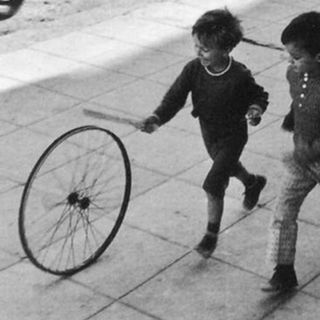
Some Indian Couples Choose a Childfree Life
“We’d rather do what we’re doing well, than be greedy, want more, and end up unhappy.”

I’ve chosen, along with my husband, to remain childless. Or rather, childfree – an important distinction to make, given that ‘less’ suggests a certain lacking.
In 2008, an American survey conducted by the country’s Census Bureau reported a marked rise in “voluntary childlessness” among women under 44, indicating that women were either choosing to delay having a child or omitting it altogether. The survey also found a correlation between education and having kids, suggesting those who are more educated are less likely to have children. And while this is an American survey, it rings true for Indians, too.
T. and husband S., who are in their mid-40s, first met in college, and have been married for 19 years. “We decided not to have kids right away,” T. says. “I mean, we were still a bit confused, but we decided when I was 33-34 that we will not have kids.”
“We were both in love with our work,” says T., who is a lawyer. “We’re very focused on ensuring that we give our bit back to society. My husband was totally devoted to an organisation and didn’t want any liabilities. I worked on a lot of pro bono cases, and my field is pretty demanding. We just decided that we’d rather do what we’re doing well, than be greedy and want more, and end up being unhappy and unfulfilled. We’re quite happy with our decision. We’ve been very busy and very productive.”
T. does feel the absence of children from time to time. But she doesn’t think she made the wrong decision. “I don’t think we have an attitude of regret. We don’t regret things,” she says. “I think I will volunteer in an orphanage or school if I miss having children around. Or just call my neighbourhood children home for stories, parties, and masti [fun].”
Shahana Malik and her long-term beau Harsh were colleagues who fell in love. They were keen on a live-in relationship, but decided to conform to societal norms by signing a marriage certificate a decade ago. However, they drew the line at having children. Now at the cusp of 40, Malik says, “We don’t see the need for [children]. We want to live our lives without compromising our freedom.” The duo has moved cities several times over the years and currently calls Indore home. “Life is good without kids, too,” Malik says.
“We don’t want to give up our current life to raise children. We’ve seen couples around us do it for the sake of it, and it doesn’t look like fun in most cases.”
Aditi Rao and her husband Sumeet Iyer met while working in Bangalore and have been together for over a decade. They made their union legal six years ago. Now in their 30s and working in the UK, they realised early on that they wanted to opt out of parenthood.
“We started to have discussions about other people’s kids and other people with kids, and that’s how we arrived at the decision together,” says Rao. “There are several reasons [for this]. We don’t want to give up our current life to raise children. We’ve seen couples around us do it for the sake of it, and it doesn’t look like fun in most cases.”
The couple also had environmental concerns. “We also strongly feel that population explosion is the cause for most problems in our country, and we don’t want to add to it,” says Rao. “As a couple, we’re very conscious of where our resources come from – we try to minimise our footprint in every way possible. So this [decision] was a big step in that direction, I guess.”
Yet, Rao does wonder what life on the other side of the looking glass is like. “I wonder what parent-child relationships are like, and I am often curious about how I would fare in a relationship like that,” she says. “But I am far too comfortable in my life now. We travel where we want, when we want, without any rules. We stay late, party, basically live like 20-year-olds. I don’t think that would’ve been possible if we’d had kids.”
She adds, “We also have pets who are like our kids. So all our affection is directed towards them.”
“I wonder what parent-child relationships are like, and I am often curious about how I would fare in a relationship like that.”
Still, Rao does continue to discuss the topic of children with her husband. “I recently brought [it] up for review. I believe a major decision like that should be reviewed from time to time. But we realised that our decision is still as firm as ever.” She concludes, “I [do] wonder if I’m missing out on something crucial in life. But I know deep down that it’s not for everyone.”
In my own case, it was only after I met a man who was certain he didn’t want the restrictive lifestyle and additional responsibilities children would necessitate, that I began to question where I stood on the issue. Once I peeled away the layers of societal conditioning, I began to see that I, too, preferred a childfree life.
It meant we wouldn’t have to agonise over how to protect our child from a troublingly unsafe country; and that we wouldn’t have to worry over affording them a good education and quality of life. Now approaching 40, with five years of marriage behind us, our individual resolves have only strengthened.
There are several other reasons couples are opting to be childfree, as Wikipedia helpfully lists. And while they’re all valid, there are ramifications of such a decision. Issues such as loneliness in old age, and practical challenges of dealing with waning health alone are common concerns.
Support groups help childfree people share and get a handle on these issues – there are several international support groups online, and in India, blogs like Childfree by Choice – India have been initiated.
I, personally, hope for retirement communities to be formed in the next couple of decades. If they aren’t established by the time my husband and I are septuagenarians, Plan B is to share a flat with single friends or move next door to those whose kids will have migrated to other countries, and who will also be alone, like us; having kids does not necessarily guarantee a carer for yourself in old age.
T. concurs with this sentiment. “We are all alone in this world. Kids don’t guarantee care,” she says. “Care comes from unseen and unknown quarters if one needs it.”
At present, it’s clear that our society doesn’t offer much support or reassurance to childfree couples (nor to any individual who is perceived as a non-conformist). Feminist Urvashi Butalia wrote a stirring essay for Livemint on the judgment and challenges she’s faced as a childfree, single Indian woman.
“People have their expectations – so be it. We had our own expectations of ourselves.”
In fact, all childfree couples have experienced the societal backlash that comes with any unconventional decision. However, Malik is not one to suffer in silence. “Inappropriate queries are definitely handled inappropriately,” she remarks. “We don’t entertain stupidity in any way.”
T. took the onslaught on an even keel. “People have their expectations – so be it. We had our own expectations of ourselves. Our expectations were more important to us than others’,” she explains.
Rao says, “It’s awkward with some family members, but we stick to our story. If they love you, they will respect your decision. Also, saying it with humor and conviction can go a long way. The idea is to be polite and firm.”
Society continues to grapple with those who go against the grain, but one hopes it will eventually allow individuals to live by their own rules. Still, it’s heartening to know that the childfree minority is paving its own path and gradually building a network of support.
For instance, the Maliks have saved up for their retirement years, which they think should take care of most of the issues of old age. Living near friends and family should take care of the rest, they believe. Malik adds, “We’ve planned it. We just hope the plan works!”
Considering all anyone can do is plan and hope for the best, these are chances all childfree couples have been willing to take.
Suchita Parikh-Mundul likes attaching helpful descriptors to nouns. For instance, she's a half-baked writer, pseudo poet, full-time bibliophile and serial vacationist. She also enjoys creating her own vocabulary, so that's 'vacationist,' explained. She's worked with print magazines and websites, and published a book of poetry (juvenilia) a long, long time ago. She currently freelances as a writer and copy editor.
Related


Study: Kids of Same‑Sex Couples Are Just as Well‑Adjusted as Kids of Hetero Couples
